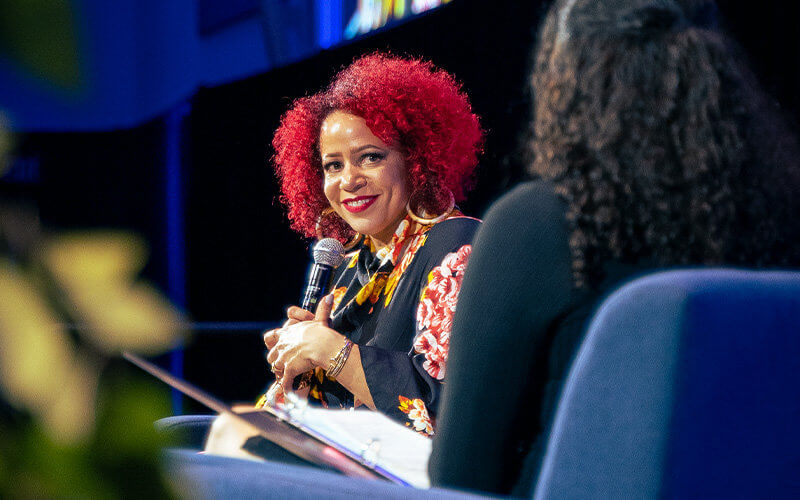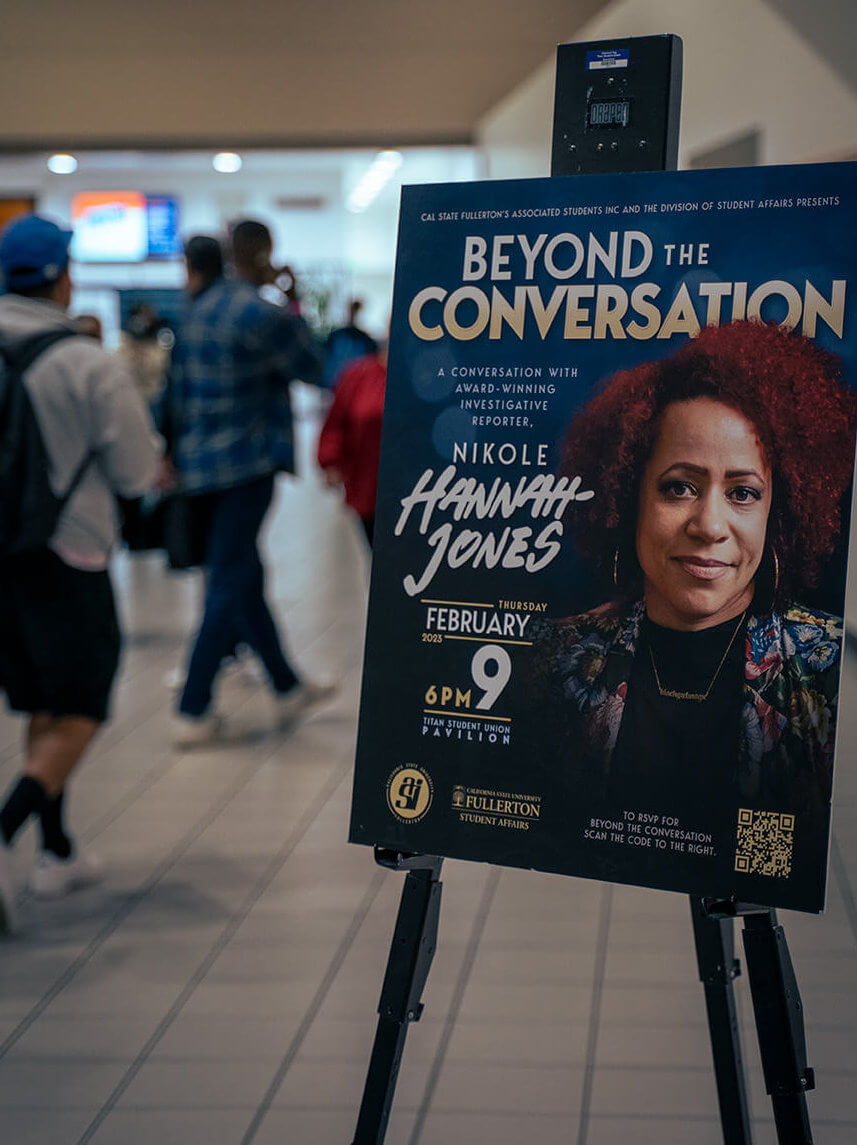
As a young girl growing up in Waterloo, Iowa, Nikole Hannah-Jones knew that she wanted to write about Black people.
“There would be no America as we know it without Black people,” said the Pulitzer Prize-winning investigative reporter. “I think Black Americans are the reason we have democracy.”

Hannah-Jones, a New York Times journalist, author and documentarian, joined the Cal State Fullerton community Feb. 9 to speak to an audience of 300 students, faculty and staff about her published work, “The 1619 Project,” and how journalism plays a critical role in reteaching history.
Her talk was part of CSUF’s “Beyond the Conversation” series, hosted by Associated Students Inc. and the Division of Student Affairs. As part of the series, speakers are invited to share their stories and encourage students to start new dialogues about diversity, equity and inclusion. Previous speakers in this series have included political activist Angela Davis, Olympic swimmer Michael Phelps and actors Danny Trejo and Daniel Dae Kim.
Creating ‘The 1619 Project’
Originally published by the New York Times in 2019, “The 1619 Project” is a series of news articles that center slavery as a foundational American institution.
“It’s attempting to unsettle our national narrative and our collective memory of who we think we are as Americans. It’s often described as a history, but it’s not. It’s about America today. Every essay looks at modern America and shows the way that slavery has shaped these institutions, even though we often don’t acknowledge it,” explained Hannah-Jones.
Since its release, the story has been adapted into a book, a Hulu documentary, a podcast and a children’s book titled “The 1619 Project: Born on the Water.” Although each medium approaches the narrative in different ways, Hannah-Jones explained that the goal is the same: to frame the Black experience in American history.
“I think most Americans want to grapple with who we are as a country,” she said. “We are a country that can be amazingly generous, and at the same time, amazingly cruel. People want to understand why that is. I think most Americans want to build a better country, but we just have been ill-equipped to understand how to do so.”
The project follows history from August of 1619 — when a ship docked in Virginia carrying more than 20 slaves — up until now, documenting how slavery and anti-Blackness have affected every aspect of American culture. Since embarking on this project, Hannah-Jones said that she’s had to surround herself with narratives that can be hard to sit with. But, she feels grateful to be bringing these stories to the forefront of news media.
“Spending years immersed in the depravity of slavery and apartheid, and all of the barbarism and horrors that Black Americans have had to live with over centuries and then knowing that I’m not just talking about people in the abstract, I’m talking about my own family — that, emotionally, was very taxing,” said Hannah-Jones.
Despite the emotional weight of telling these stories, the award-winning reporter said that it helps to remember that she’s not powerless to make change.
“When I see something in the world that I don’t like, or I think is unfair, I don’t ever feel powerless about it because I have a tremendous megaphone. I can go write something and make people see it or have to deal with it,” she said.
Advice for a New Generation of Journalists
Starting out as an “old school print journalist,” Hannah-Jones said that one of the hardest things she had to learn was how to pitch stories and get them approved. She shared two key pieces of advice: “Make yourself undeniable” and “Report around every objection.”
When she first started pitching stories about racial injustice in the United States, she received comments like, “We already know that story.” But what she learned was that they only knew one side of that story. She dedicated her work to uncovering truths that had been erased from the American narrative.
“I don’t think one chooses the field of journalism if you want to make powerful people comfortable. You should expect resistance when you’re challenging a normal way of thinking. You have to have a stiff back. That’s what this job requires,” she added. “The highest quality of journalism is to inform and to make people inherently skeptical of power and institutions.”
For student reporters looking to break into the industry, Hannah-Jones said that journalism is a give and take between editors and writers. But no matter what, it’s important to stay true to yourself and your beliefs.
“Don’t ever put your name on a story that you’re not proud of. There will be times — and I certainly learned this — where sticking to yourself, your morals and your ethics will cost you. I think we all have to make a decision: Is success worth it if you have to sell yourself out to get it? And I would say no.”
Hannah-Jones’ full “Beyond the Conversation” talk can be found on Titan TV’s Youtube channel.